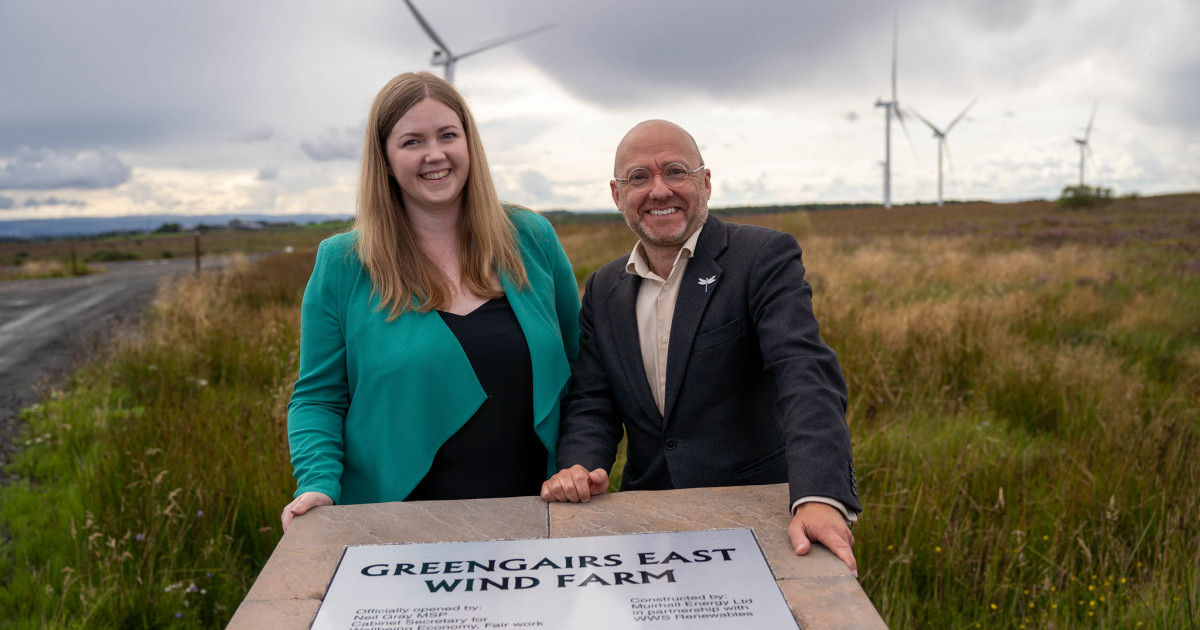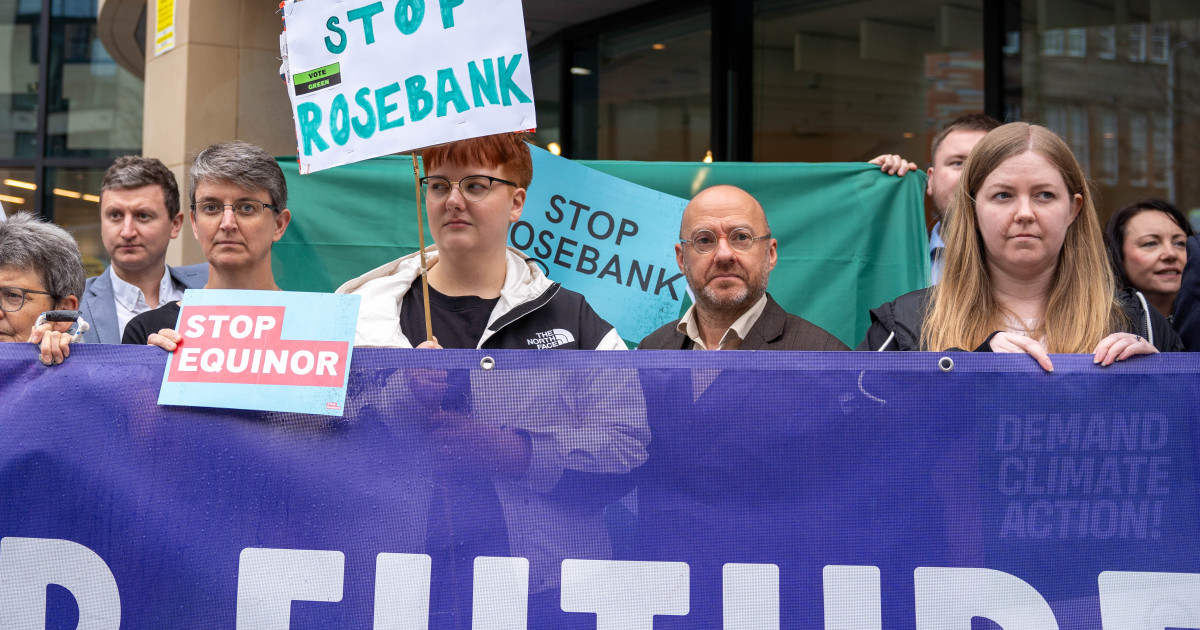Climate is the new front in Prime Minister's culture war
For Scottish Climate Week the party's co-leader Patrick Harvie MSP talks about the challenges ahead in delivering net zero

This year, more than ever, it has felt that every week is climate week, with our news media full of frequent and vivid reminders of the climate breakdown that is already happening.
Devastating floods, wildfires, land destroyed, species pushed to the brink. But climate week feels different this year for another reason too.
We are now faced with two scenarios.
One where leadership prevails, where governments respond with urgency and give the stability for businesses and investment, and ensure fairness and support for households and communities to cope with the rapid change that’s needed.
Or one which is characterised by policy reversals and where the next general election is the only horizon in sight.
The Prime Minister’s speech last week signalled a clear decision to choose the latter.
He stood behind a podium with the slogan “Long term decisions for a brighter future” while reading a speech which amounted to a betrayal of both current and future generations.
He spoke about “being honest with the public”, and proceeded to knock down straw men in his hunger to generate a climate culture war. I lost count of the entirely non-existent policies he reeled off before saying “I’ve scrapped it”.
What he scrapped, was any shred of credibility he had on climate.
There are some on the right who are sincere in a belief that free market economics can solve the crisis, even though it has been the cause.
I profoundly disagree.
But at least they acknowledge the reality of the climate emergency, and do want to respond, even if they are, in my view, misguided.
So the Prime Minister could have listened to Alok Sharma, for example, his Conservative colleague who chaired COP26, and who said he was: “Concerned about fracturing of UK political consensus on climate action. Chopping and changing policies creates uncertainty for businesses and the public. Ultimately this makes it more difficult to attract investment and pushes up costs for consumers”
But instead Rishi Sunak’s cheerleaders are the likes of Liz Truss and Jacob Rees-Mogg. Even Donald Trump has weighed in to support the Prime Minister. And of course, the Scottish Conservatives.
The same people who just a year ago were urging Scotland to copy Liz Truss in policies which crashed the economy are now urging Scotland to follow Rishi Sunak’s policies which will do the same to our global life support system.
For the Scottish Tories it’s no lessons learned, no reflection, no backbone.
It won’t come as any surprise that I disagree with the Conservatives and their Prime Minister. It’s also clear that most of the public doesn’t trust them on this issue either.
But where we are now is not just about policy differences but also about the role of this Parliament. What the UK government chooses to do has a very significant impact on what we are able to do in Scotland. It could not be otherwise within the limits of devolution.
When the climate targets were set, of course we didn’t agree with the UK Government on policy detail, but there was enough reason to think that the UK would have a hope of government that was vaguely rational, and which was willing to communicate and cooperate despite our differences.
That need for cooperation was set out clearly by the UK Climate Change Committee very recently, telling all the governments in the UK that we needed to try harder to work together. And within days, comes this wrecking ball through climate policy, without a word of communication either with us, or with the Welsh Government.
And they’ve got form; this is the same UK Government which a few months ago very deliberately sabotaged the deposit return scheme which the Scottish Parliament voted for. It did do by insisting that our scheme had to align with their scheme.
A scheme that did not exist. A scheme that, it is increasingly clear, will never exist under this UK Government.As cynical an act of vandalism as I have seen. Not just to our green ambitions. But to our Parliament’s ability to legislate.
The direct harm done by this change of policy will be bad enough. But there is also a huge missed opportunity, in the positive steps which could have been taken instead.
Let’s take the heat in buildings agenda – there are important things we can do here with the powers we have.
That is why we will have a New Build Heat Standard from next April, a year ahead of the rest of the UK, which ensures that all new buildings will have a climate friendly future-proofed heating system.
Why also we are making good progress towards improving energy standards in new homes, towards a Passivhaus equivalent.
It’s why we want all homes to achieve good levels of energy efficiency, and we know that private tenants need that improvement urgently.
And why we have the most generous grants and loans scheme for heating and energy efficiency works in the
UK. When we in Scotland have the levers, we match ambition with action.
But we don’t have control over the capacity of the grid to match the increasing electrification of heat and transport.
We don’t control the difference in unit price of gas and electricity which the UK Government has repeatedly promised to put right and which is perhaps the biggest step which could make the heat transition more affordable for people.
We don’t have leverage over regulation of products and installers, which is being used as one of the main routes to heat transition in other European countries, and which is needed to give clear signals to industry to guide their investment.
We don’t even control large scale insulation programmes like ECO4 and Warm Homes Discount – now rebadged as the Great British Insulation Scheme – and on which our repeated requests to UKG to join them more effectively with our own schemes have simply been ignored.
That’s true of the heat transition.
And also how we shift transport towards public transport, active travel and electrification of vehicles; how we deal with waste, manage land, support our industries to reap the economic benefits of a net zero future.
The Prime Minister could have made decisions for the long term. He could have been the driver of change. He could have put himself on the side of households and community organisations in making sure that our journey to a zero carbon future is a just and fair one.
Which tackles fuel poverty as well as emissions.
Focuses our energy security on our own clean, green renewables rather than turbulent fossil fuel markets.
Tackles congestion, air pollution. Backs home-grown jobs and training in the circular economy.
And the last week has shown that there is and remains an appetite to pursue a just transition to a net zero future. The Scottish Government has signalled that we will work with other devolved nations and with other parties to step when UK Government leadership has failed.
Because Sunak’s motives are clear.
He has acted to create a new, partisan dividing line, where our politics needs united determination. He has done this because he sees political opportunity from making climate a new front in his culture war.
So Scottish Climate Week might be an annual event but this year, more than ever before, we need to re-capture the shared sense of urgency, which shaped the first Climate Change Act and led all parties to work to strengthen it.
Across the political spectrum there are those who know we need to lead with urgency and others who would prefer to downgrade, delay, dilute climate action. But because our wider society made that demand clear to all parties, all parties had to listen.
Every political party needs to know that they can only prosper by offering solutions.
That is where Scotland’s Parliament and Scotland’s Government will stand.



